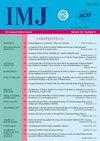IMMUNE CHECKPOINT BLOCKADE IN BREAST CANCER THERAPY
Q4 Medicine
引用次数: 0
Abstract
Despite advances in early detection and treatment, breast cancer remains the deadliest oncopathology for women worldwide. Today there is an urgent need for new approaches to this disease treatment. Recently, immune therapy, especially inhibitors of immune checkpoints, has taken the lead when fighting against cancer. Blocking immune checkpoints is an effective approach to enhance the effector T cell function. Immune checkpoint blockers, namely inhibitors of cytotoxic T−lymphocyte−associated antigen 4 (CTLA−4), programmed cell death protein 1 (PD−1) and ligand 1 of programmed cell death protein 1 (PD−L1) are approved by the US Food and Drug Association (FDA) to be used in various solid tumors, refractory cancers with microsatellite instability, classical Hodgkin's lymphoma. In March 2019, the first inhibitor for the treatment of breast cancer was approved, i.e. atezolizumab (anti−PD−L1) in combination with nab−paclitaxel in the patients with metastatic triple−negative breast cancer, which aroused the interest of experts in the study of immunotherapeutic agents for the treatment of these patients. The review presents the results of using the inhibitors of immune control points in monotherapy and in combination with standard methods of antitumor treatment (chemotherapy and radiotherapy, targeted therapy) in patients with breast cancer. Information on potential biomarkers of response to immunotherapy in breast cancer is presented. Key words: breast cancer, checkpoint inhibitors, biomarkers of response.免疫检查点阻断在乳腺癌治疗中的应用
尽管在早期检测和治疗方面取得了进展,但乳腺癌仍然是全世界妇女最致命的肿瘤病理。今天,迫切需要新的方法来治疗这种疾病。近年来,免疫疗法,特别是免疫检查点抑制剂,在对抗癌症方面已经占据了主导地位。阻断免疫检查点是增强效应T细胞功能的有效途径。免疫检查点阻滞剂,即细胞毒性T淋巴细胞相关抗原4 (CTLA - 4)、程序性细胞死亡蛋白1 (PD - 1)和程序性细胞死亡蛋白1 (PD - L1)配体1的抑制剂,已被美国食品和药物协会(FDA)批准用于各种实体瘤、微卫星不稳定性难治性癌症、经典霍奇金淋巴瘤。2019年3月,首个用于乳腺癌治疗的抑制剂atezolizumab (anti - PD - L1)联合nab -紫杉醇用于转移性三阴性乳腺癌患者,引起了专家们对治疗这些患者的免疫治疗药物研究的兴趣。本文综述了免疫控制点抑制剂在乳腺癌患者单药治疗和联合标准抗肿瘤治疗方法(化疗、放疗、靶向治疗)中的应用结果。介绍了乳腺癌免疫治疗反应的潜在生物标志物的信息。关键词:乳腺癌,检查点抑制剂,生物标志物反应
本文章由计算机程序翻译,如有差异,请以英文原文为准。
求助全文
约1分钟内获得全文
求助全文
来源期刊

International Medical Journal
医学-医学:内科
自引率
0.00%
发文量
21
审稿时长
4-8 weeks
期刊介绍:
The International Medical Journal is intended to provide a multidisciplinary forum for the exchange of ideas and information among professionals concerned with medicine and related disciplines in the world. It is recognized that many other disciplines have an important contribution to make in furthering knowledge of the physical life and mental life and the Editors welcome relevant contributions from them.
The Editors and Publishers wish to encourage a dialogue among the experts from different countries whose diverse cultures afford interesting and challenging alternatives to existing theories and practices. Priority will therefore be given to articles which are oriented to an international perspective. The journal will publish reviews of high quality on contemporary issues, significant clinical studies, and conceptual contributions, as well as serve in the rapid dissemination of important and relevant research findings.
The International Medical Journal (IMJ) was first established in 1994.
 求助内容:
求助内容: 应助结果提醒方式:
应助结果提醒方式:


